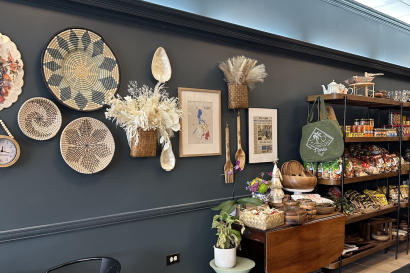I write this from my home in New York, looking out the window on the snow covered ground as the breeze from the thirty-degree weather blows through my open window. It's a harsh change from the humid summer weather of South America that I was in approximately 48 hours ago. It's been 48 hours since my plane landed in the United States and I've spent a lot of this time longing to be back in South America. To walk the streets of Buenos Aires and Santiago with the amazing friends that I've made during my time abroad. To eat empanadas and alfajors while choppily speaking the Spanish language.
It's been weird.
It's an adjustment being back home and feeling that I have to get readjusted to the country that I've lived in for twenty years. I never thought that I'd have culture shock in my own country! I've reached out to my study abroad friends to know that they're going through the same thing.
But in my quiet and my solace, it's given me time to reflect on my experience. My identity while abroad. My advantages and disadvantages from studying abroad.
One thing that I've definitely become more conscientious of is my skin color when abroad. In New York City, the lovely city where I grew up, diversity is embraced and encouraged. I see people of all different skin colors and backgrounds wherever I walk and it's normal. Although there have been varied situations where I felt "othered", it was never as serious as it was in Argentina. I remember going days without seeing people of color and I remember the stares that I'd get while on the metro. It made me uncomfortable but it allowed me to reflect. They probably had a predisposed opinion of me based solely on my skin color.
I also realized the advantage and privilege that I had while being American - it was definitely something that I had taken for granted. Although my skin color was one thing, people definitely would treat you differentely upon hearing the American gringo accent and a mastery of the English language. Chile had a high Haitian immigrant population, who naturally speak Haitian Creole as their first language and are probably learning both Spanish and English. I remember navigating different spaces and seeing the look of relief on people's faces when I spoke in English or when I introduced myself as somebody from the Estados Unidos... how differently would they treat me as a Haitian? Or somebody from another African nation? Would it be met with contempt or disrespect? I definitely was seen as a "cool" person of color, in with what they saw as the benefits of black culture. I was rap music and urban dress while the immigrants and other people of color were the poor and the uneducated. It disgusted me but it made me realize my privilege and the role that I could play.
Another situation where I feel I've grown was with people who suffer from learning the main language in a country. After having to navigate Argentina, Chile, Peru and Uruguay as a native English speaker with limited Spanish exposure (I have only been learning Spanish for ONE year), I have the utmost respect for immigrants who come to the United States and do their best to learn English. I know how hard it can be and how anxious something as simple as going to a restaurant and ordering food can be. I know the painful feeling of being laughed at for just trying your best at a local language. I know how it feels to want to quit and want to give up.
Overall, the 102 days that I spent in South America were some of the best days in my life. I was challenged and pushed to the edge and it made me a stronger and better person. From hiking Macchu Picchu, to suntanning on the beaches of Pichilemu to sipping mate in the coastline of Montevideo to watching the amazing waterfalls of Iguazu... I would not exchange this learning experience for anything.

Aidan Dennis
<p>I'm a New York City born and Long Island raised lover of food, travel and culture who currently goes to college right outside of Boston, Massachusetts! One of my favorite hobbies has to be reading and I spend every summer dedicating myself to a very intensive reading list.</p>








